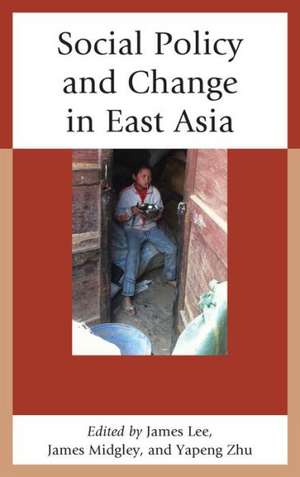Social Policy and Change in East Asia
en Limba Engleză Hardback – 11 dec 2013
Preț: 709.94 lei
Preț vechi: 972.52 lei
-27% Nou
Puncte Express: 1065
Preț estimativ în valută:
135.89€ • 147.66$ • 114.22£
135.89€ • 147.66$ • 114.22£
Carte tipărită la comandă
Livrare economică 21 aprilie-05 mai
Preluare comenzi: 021 569.72.76
Specificații
ISBN-13: 9780739174562
ISBN-10: 0739174568
Pagini: 205
Dimensiuni: 155 x 231 x 18 mm
Greutate: 0.36 kg
Editura: Rowman & Littlefield
ISBN-10: 0739174568
Pagini: 205
Dimensiuni: 155 x 231 x 18 mm
Greutate: 0.36 kg
Editura: Rowman & Littlefield
Notă biografică
Cuprins
Table of Contents
List of Figures
List of Tables
Acknowledgments
Introduction: Change and Social Policy in East Asia
James Midgley, James Lee & Yapeng Zhu
Chapter 1: Economic Turbulence and Social Welfare: Social Policy and Social Development
Perspectives
James Midgley
Chapter 2: Gender, Social Security and Citizenship: Experiences in Four East Asian Cities
Kam-wah Chan, Patricia Kennett & Lucille Lok-sun Ngan
Chapter 3: Risk Governance in Financial Tsunami in Mainland China, Hong Kong and Taiwan
Raymond Man-hung Ngan
Chapter 4: Financial Crisis and Institutional Response in the Reconstruction of Chinäs Social
Welfare System ¿ Keqing Han
Chapter 5: Towards Integrated Healthcare for Migrants in Mainland China
Qiaobing Wu & Kai Liu
Chapter 6: Economic Crisis and Housing Policy Development in China
Yapeng Zhu
Chapter 7: Maintaining Power or Maintaining the Law: How Corporate Social Responsibility
with Chinese Characteristics Challenges Traditional Western Model?
Heidi Reed
Chapter 8: The Legitimacy Crisis of the Mandatory Provident Fund Scheme in Hong Kong Kim-wah Chung
Chapter 9: Housing Policy and Asset Building: Exploring the Role of Home Ownership in
East Asian Social Policy
James Lee
Bibliography
Descriere
Social Policy and Change in East Asia examines the current state of social policy and social development in East Asia and argues that these two domains should be integrated in order to improve social welfare. This book distinguishes itself by avoiding a Eurocentric approach to social policy analysis, focusing instead on the relationship between institution and development.
